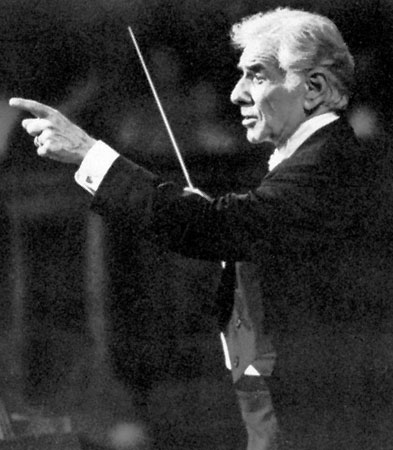
LINCOLN, Neb.— Leonard Bernstein completed his suite of brass pieces on April 8, 1959. They were written for members of the New York Philharmonic and received their premier at Carnegie Hall. The pieces were commissioned by the Juilliard Musical Foundation. This set of pieces, to be performed by members of the UNL School of Music faculty, is rarely performed as a set and are all influenced by Bernstein's love of jazz. The event will take place at 3 p.m., September 22 in Kimball Recital Hall.
Leonard Bernstein unquestionably loved dogs, and showed this by writing numerous short pieces with a particular one in mind. Bernstein left us this mini-ode, Rondo for Lifey, dedicated to a skye terrier owned by the composer's friend, actress Judy Holliday. The piece begins with an expressive intro, quickly followed by pervasive staccato phrasing throughout. Elegy for Mippy I and II are popular pieces with his brother Burtie's dog in mind. Mippy I was written for horn and piano. Mippy II is for solo trombone. Tragedy struck Mippy, and each of these pieces help signify the dog's second coming.
“Not only did Leonard Bernstein love jazz, he loved the brass section as well,” said Hixson-Lied Professor and UNL School of Music Area Head for Brass and Percussion Scott Anderson. “The feeling was mutual. Bernstein is credited with championing the symphonies of Gustav Mahler and resurrecting them. No pun intended. Brass players live to play Mahler!
“Bernstein was an early advocate of brass chamber music. It was not unusual to see him backstage after rehearsals listening to his low brass section play transcriptions of works by Beethoven, Mozart and Berlioz. Allen Ostrander did most of the arranging for his section mates Gordon Pulis, Lewis van Haney and Bill Bell. Later in his career Bernstein would encourage young brass players from the Boston Symphony to strike out as chamber musicians and for the Empire Quintet following the premier of his Mass. The pieces from 1959 are rarely performed as a set and like were not conceived to performed that way, but we thought that it would be interesting to have all of the pieces performed in this manner and finish it off with the quartet Fanfare for Bima. It sounds more difficult than it really is…each piece in less than three minutes long. Bernstein wrote the brass quartet, Fanfare for Bima, which was scored for trumpet, trombone, horn, and tuba. Bima was Serge Koussevitzky's black cocker spaniel. This fanfare is based on the theme, which was whistled in the Koussevitzky household to call his dog.”
Each member of the brass faculty (K. Craig Bircher, Alan Mattingly, Scott Anderson and Craig Fuller) will perform a solo sonata accompanied by Michael Cotton in the second half of the program.
Cost of the event is General Admission $5; Students/Seniors $3.